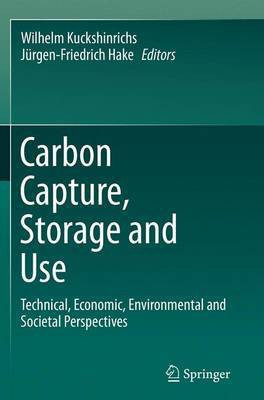Carbon Capture, Storage and Use(English, Paperback, unknown)
Quick Overview
Product Price Comparison
Carbon Capture and Storage technologies (CCS) are moving from experiment toward commercial applications at a rapid pace, driven by urgent demand for carbon mitigation strategies. This book examines the potential role of CCS from four perspectives: technology development, economic competitiveness, environmental and safety impacts, and social acceptance. IEK-STE of Forschungszentrum Juelich presents this interdisciplinary study on CCS, based on methods of Integrated Technology Assessment. Following an introductory chapter by editor Wilhelm Kuckshinrichs, Part I of the book surveys the status of carbon capture technologies, and assesses the potential for research and development of applications that are useful at scales required for meaningful mitigation. Transportation, Utilization and Environmental Aspects of CO2 receive chapter-length treatments, and the section concludes with an examination of safe geological storage of CO2 based on the example of the Ketzin pilot site, not far from Berlin. Part II covers Economic and Societal Perspectives. The first chapter discusses the use of CCS in the energy sector, analyzing costs associated with electricity generation and CO2 mitigation on the basis of technology-specific cost and process parameters, along with a merit-order illustration of the possible implications of CCS facilities for energy costs. Later chapters outline the costs of CCS application in energy- and CO2-intensive industries; analyze system characteristics of CCS infrastructures, showing that the infrastructure cost function depends on the ratio of fixed to variable costs, as well as on the spatial distribution of CO2 sources and storage facilities; interpret cross-sector carbon mitigation strategies and their impacts on the energy and CO2 balance; and discuss awareness and knowledge of CCS, attitudes towards it, and how the risks and benefits of CCS are perceived. Part III discusses the Framework for Energy and Climate Policy, with chapters on acceptance and adoption of CCS policy in Germany, and the EU, and an assessment of international cooperation in support of CCS. The final chapter summarizes the central arguments, discusses the potential role of carbon capture and utilization as part of a German transformation strategy, and extrapolates the findings to European and international contexts.


